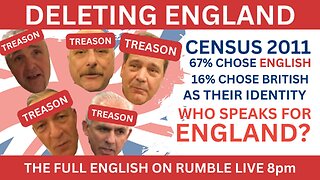Premium Only Content

Reese Mogg, David Kurten. England and TREASON. It cannot be pardoned! Watch
Treason is deemed too heinous to be forgiven because it directly threatens the foundation of the state and the sovereign's authority. NO ONE CAN PARDON TREASON.
The principle that treason cannot be pardoned by the monarch or executive authority has its roots in English constitutional history. It underscores the gravity of treason as a crime against the state and the monarch's sacred duty to the realm.
Key Explanation
Treason as an Unpardonable Offense:
Treason is deemed too heinous to be forgiven because it directly threatens the foundation of the state and the sovereign's authority.
The act of betrayal is considered not merely a crime against the monarch but against the collective safety and order of the realm.
Limit on the Royal Prerogative:
The monarch traditionally held the prerogative of mercy, including issuing pardons. However, Lord Somers and Sir John Holt argued that treason lies outside this scope because it is an affront to divine and earthly order.
This limitation reflects the belief that such a crime warrants divine judgment, not human forgiveness.
Role of Subjects and Divine Justice:
The notion that it is for "subjects of the realm to arrange the meeting" implies that punishment for treason is a duty of justice that subjects must fulfill, leaving ultimate judgment to God.
Citations and Historical References
Lord John Somers:
Somers was a prominent constitutional thinker and played a key role in the drafting of the Bill of Rights 1689. While not explicitly written in his works, his broader constitutional arguments emphasize the limits of royal power in matters of justice.
Sir John Holt:
Chief Justice Holt (1642–1710) was a defender of the rule of law and the idea that no one, including the monarch, is above it. His rulings and opinions frequently upheld the principles of constitutional limitations on prerogatives.
Legal Precedent:
The principle that treason is beyond pardon is reflected in practices such as the Treason Act 1351, which codified treason as the gravest crime.
In constitutional law, the Bill of Rights 1689 further limited royal prerogatives and reinforced parliamentary authority over such grave matters.
The Role of God:
The idea that treason is for "God to decide" stems from deeply rooted Christian theology of justice during this era, where divine authority was seen as paramount in cases of extreme moral offense.
Summary
Treason is deemed an unpardonable crime under English constitutional tradition, as argued by figures like Lord Somers and Sir John Holt. This reflects the principle that the monarch's prerogative of mercy does not extend to crimes of such severity, leaving ultimate judgment to God. This principle is rooted in the legal and moral framework of the Treason Act 1351 and the constitutional balance codified in the Bill of Rights 1689.
-
 56:59
56:59
The Full English Show
11 days agoWho speaks for England and the English? Only the English Constitution Society!
4.76K76 -
 2:37
2:37
Canadian Crooner
1 year agoPat Coolen | Let It Snow!
2.45K8 -
 2:44
2:44
BIG NEM
7 hours agoWhat's Really Behind the Fake Alpha Male Epidemic?
1.05K2 -
 57:20
57:20
State of the Second Podcast
7 days agoThe Inventor of Bump Stock Fights Back! (ft. Slide Fire)
1.31K1 -
 1:04:12
1:04:12
PMG
1 day ago"I’ll be DRONED for Christmas!"
2.37K -
 23:38
23:38
RealitySurvival
1 day agoBest Anti-Drone Rounds For Self Defense
2.35K2 -
 57:43
57:43
barstoolsports
14 hours agoBest Shot Wins The Game | Surviving Barstool S4 Ep. 7
193K9 -
 1:52:24
1:52:24
Kim Iversen
9 hours agoLuigi Mangione Charged With TERRORISM | Liz Cheney Accused Of WITNESS TAMPERING, Faces 20 YEARS IN JAIL
99.9K130 -
 6:50:10
6:50:10
Akademiks
10 hours agoJay Z says he aint NEVER been friends w/ DIDDY! Bhad Bhabie lost her man? Travis Hunter Down Bad?
106K12 -
 2:27:04
2:27:04
AirCondaTv Gaming
9 hours ago $21.76 earnedWar Thunder - Tankering Around for That 10 Bomb
53.6K4